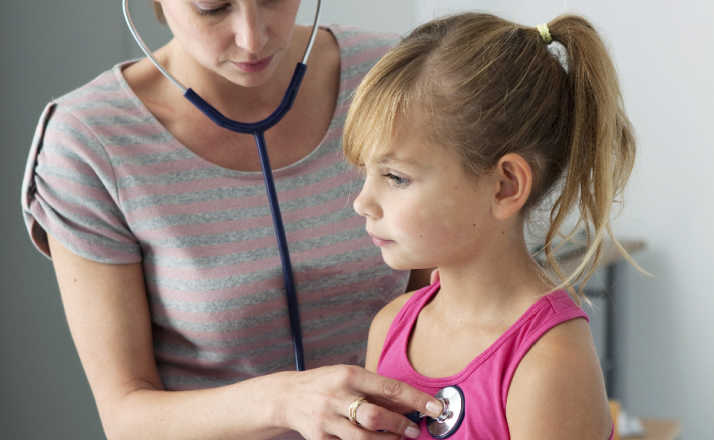This morning, I took my 6-year-old daughter to the pediatrician for her annual checkup. The doctor took a peek inside her ears and mouth with an otoscope, listened to her heart and lungs, and asked my daughter about what foods she likes to eat and how she liked school this year.
She bent down to touch her toes so the doctor could make sure her spine didn’t have any concerning curves.
My daughter read an eye chart from across the room and raised her hand when she heard beeps during a hearing test.
Save for being pleasantly surprised that she wasn’t due for any shots, the appointment went about the same as all the other annual checkups I’ve scheduled for my children.
Next time, there will likely be some small but very important changes to your child’s well-visit though.
In a July 2021 statement, The American Academy of Pediatrics has updated its policy recommendations to include four questions for pediatricians to ask patients at their yearly exams.
These questions are aimed at screening children for heart problems that could lead to sudden cardiac arrest or death, which kills 2,000 people under the age of 25 annually.
Incorporate cardiac risk screening for all youths at least every 3 years, the @AmerAcadPeds and @PACESep say in updated guidance: https://t.co/VtWQJZ8icy pic.twitter.com/pW76STEZGD
— AAP News (@AAPNews) June 21, 2021
Sudden cardiac arrest is when the heart suddenly stops beating.
It is usually precipitated by ventricular fibrillation– when the ventricles of the heart start to quiver rapidly and irregularly.
The purpose of the new screening protocols is to help pediatricians identify children who may have risk factors for cardiac arrest that would normally be overlooked or missed.
If the answer to any of the four screening questions is yes, a cardiology exam should follow to check for irregularities in the anatomy of the heart and to more closely examine any family history of cardiovascular issues or sudden deaths.
The questions that will likely be added to forms you fill out for your child’s wellness checkup are:
- Have you ever fainted, passed out, or had an unexplained seizure suddenly and without warning, especially during exercise or in response to sudden loud noises such as doorbells, alarm clocks, and ringing telephones?
- Have you ever had exercise-related chest pain or shortness of breath?
- Has anyone in your immediate family (parents, grandparents, siblings) or other more distant relatives (aunts, uncles, cousins) died of heart problems or had an unexpected sudden death before age 50? This would include unexpected drownings, unexplained car accidents in which the relative was driving, or sudden infant death syndrome.
- Are you related to anyone with hypertrophic cardiomyopathy or hypertrophic obstructive cardiomyopathy, Marfan syndrome, arrhythmogenic right ventricular cardiomyopathy, long QT syndrome, short QT syndrome, Brugada syndrome, or catecholaminergic polymorphic ventricular tachycardia, or anyone younger than 50 years with a pacemaker or implantable defibrillator?
I am a mother who dwells and worries. Like many other parents, am kept up at night by various anxieties I have about my children.
Adding a pediatric heart attack to the list is not going to help me sleep tonight.

However, I am trying to remind myself that this is good news.
Doctors are making these changes to help identify otherwise normal kids who may be at risk. These four questions could (and hopefully will) save lives.
Because those 2,000 young people who die each year from sudden cardiac death— a lot of them appear to be healthy kids and young adults. Many are athletes.
This screening is going to help identify kids whose heart conditions may have otherwise gone undetected until it’s too late.
When I was a sophomore in high school, I wore a heart monitor for several weeks because I was easily out of breath during gym and sometimes felt a weird fluttering in my chest.
Anytime I felt the fluttering, I would press a button on my heart monitor and it would take a recording.
Eventually, I was diagnosed with supraventricular tachycardia.
My heart beats faster than it should. Sometimes, it’s just one half of my heart that beats too fast, which causes the fluttering sensation.
Mine is one of the many, many congenital heart defects that sound scary and dangerous. But, there are many heart conditions that are not life threatening.
SVT is the most common arrhythmia in children and is honestly kind of boring.
I would have answered yes to two of the screening questions, had they been asked 8 million years ago when I still saw a pediatrician.
In their policy update, the AAP states that the purpose of these new recommendations is not merely to identify congenital heart defects because many of them do not mean there is a risk of cardiac arrest.
These questions are meant to identify those at risk for sudden cardiac death.
So a “yes” to any of the four questions is not a reason to immediately panic. It’s just reason to get your kid into a cardiologist’s office.











